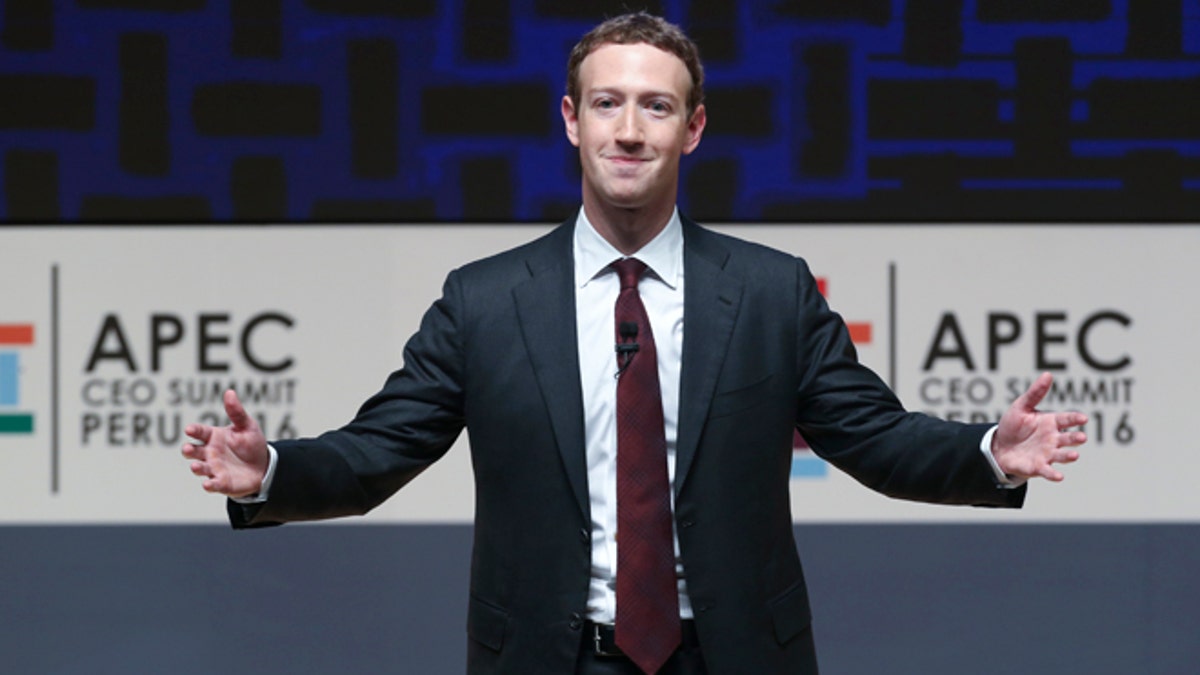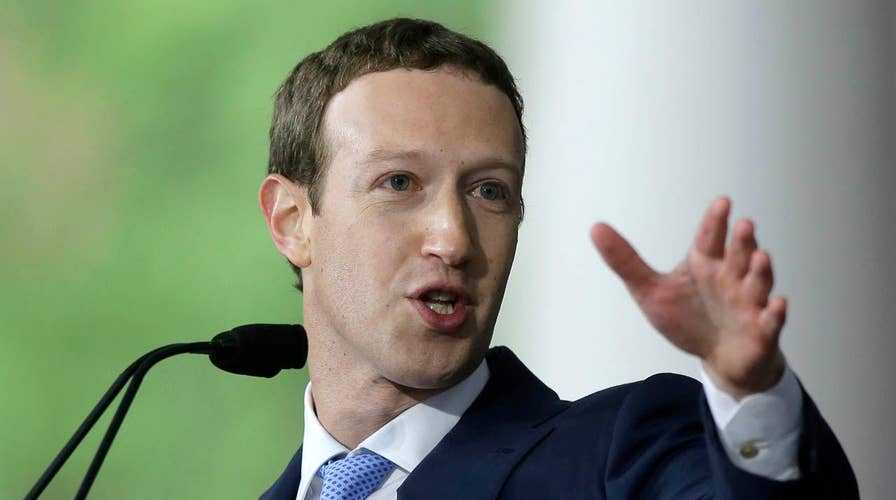Why is Mark Zuckerberg getting political?
The Facebook founder has been visiting political battlegrounds; Peter Doocy has the story for 'Special Report'
Facebook’s Mark Zuckerberg might want to re-think his presumed presidential ambitions.
With Facebook in the news for being’s Russia’s dupe – or worse – during the 2016 elections, Zuckerberg himself reportedly a likely witness before the Senate Intelligence Committee, and Facebook having been slapped with a search warrant in connection with Special Counsel Robert Mueller III’s criminal probe, now is not the best time for Zuckerberg to be gearing up for a run for the White House.
Talk about distractions.
Just because folks use your product, doesn’t mean they will vote for you; and just because you’re a billionaire, doesn’t make you an attractive candidate.

FILE -- In this Nov. 19, 2016, file photo, Mark Zuckerberg, chairman and CEO of Facebook, speaks at the CEO summit during the annual Asia Pacific Economic Cooperation (APEC) forum in Lima, Peru. (AP Photo/Esteban Felix)
Remember, Ross Perot failed twice in his presidential bids, in 1992 and 1996. And while former New York City mayor Mike Bloomberg may have had high-end Blue America precincts swooning at the thought of a run, that’s hardly a demographic large enough to win a nomination, let alone the White House.
To this day, Facebook does not know how much Russia spent on Facebook to interfere with our election and boost Trump’s candidacy. Congressional investigators are also growing ever more disturbed that Facebook may be dragging its feet on turning over “key” information to Congress.
Then there is Donald Trump. And make no mistake, Zuckerberg is no Trump. For one thing, Zuckerberg is a lot richer. He ranks no. 4 on the Forbes 400, and is estimated to be worth north of $70 billion, while Trump trails in 121st place, with a paltry $3.7 billion pile, according to Forbes.
Still, it’s not simply about who has more stashed in the bank.
Compare Trump, live and in the flesh on “The Apprentice,” with Jesse Eisenberg’s portrayal of Zuckerberg in the 2010 biopic “Social Media.” Yes, “Social Media” won three Oscars, while Trump could not even grab a single Emmy, as Alec Baldwin was kind enough to remind us. But the larger reality is that Trump’s time on television earned him an enduring fan base, while the celluloid version of Zuckerberg left him with a far smaller pool of devotees whose nexus to fly-over country is rather limited.
Just look at Zuckerberg’s recent effort to connect with voters in his self-proclaimed 50-state listening tour. Zuckerberg has talked about and done things that the punditocracy expects would-be presidential contenders to do. Zuckerberg visited Mother Emanuel AME Church in South Carolina, where in 2015 a hate-filled teenager murdered nine African-Americans. He also talked about opioid addiction in the Rust Belt.
We are not, however, describing a boffo box office performance. Perhaps a glimpse at Zuckerberg’s Facebook page offers a clue or two, because even in the aftermath of Brexit, Bernie Sanders, and America First, Zuckerberg is touting a global kumbaya moment, where the only things missing are mandatory hand-holding and stranger-hugging. Says Zuckerberg, “We have to build a world where we care about a person in India or China or Nigeria or Mexico as much as a person here.”
Hint, Americans like caring about Americans before others. Hint, hint, mercantile and moralizing can get kind of grating, especially coming from someone as cossetted as Zuckerberg.
Which brings us back to Russia, and the issues of privacy and Facebook’s targeted ads. To this day, Facebook does not know how much Russia spent on Facebook to interfere with our election and boost Trump’s candidacy. To compound Zuckerberg’s headaches, congressional investigators have grown ever more disturbed that Facebook may be dragging its feet on turning over “key” information to Congress.
Oh, and then there is the matter of Facebook’s targeted ads that empowered white-supremacist groups by giving a lifeline to advertisers who wished to target “Jew haters” and members of the “Nazi Party,” a factoid discovered by Pro Publica, the Pulitzer-winning, not-for-profit investigative journalism group.
Against this backdrop, Zuckerberg might want to take a page from Mark Hanna’s playbook, the 19th century kingmaker from Ohio. Instead of running for president himself, Hanna, a rich-guy, pushed for William McKinley. The rest is history.
So, while Zuckerberg comes with a lot of cash, he also brings his own considerable baggage. Whether it weighs his ambitions down, we will find out soon enough.





















